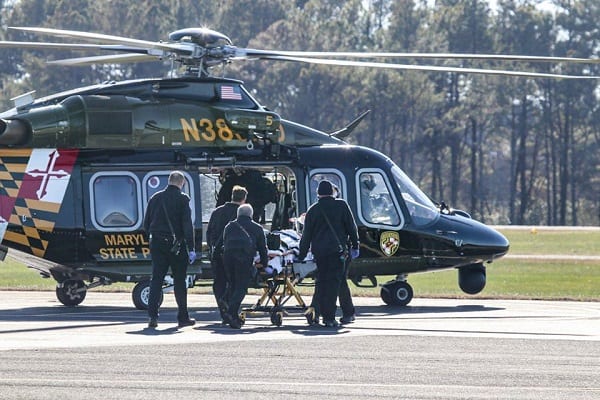MIDDLE RIVER, MD—An important life-saving initiative kicked off in Middle River this week.
The Maryland State Police (MDSP), Maryland Institute for Emergency Medical Services Systems (MIEMSS), and University of Maryland Medical Center (UMMC) have announced a new public-private collaboration for lifesaving trauma response for Marylanders. Whole blood is used for emergency transfusions when minutes are critical, and is now available on board MSP’s fleet of “Trooper” helicopters used in prehospital air medical response for critically injured patients.
Whole blood, which is blood that has not been separated into components, contains all of the factors necessary for optimal clotting and has become the blood product of choice for the resuscitation of patients with extreme bleeding at leading trauma centers across the United States and elsewhere over the last five years.
The “Blood on Board” project began with an initial roll out on May 10th starting with Trooper 1 (Martin State Airport in Baltimore County) and Trooper 2 (Joint Base Andrews in Prince George’s County) to ensure all necessary logistical details were working as planned. The project was expanded to the remaining five Maryland State Police Aviation Command bases during the month of July. Maryland is the first state in the country to offer this lifesaving Blood on Board initiative as a statewide service.
This project is an example of the continual growth of the unique partnerships that comprise Maryland’s trauma response system. Marking 50 years this year as a statewide network, this partnership provides Marylanders with increased care that reduces the number of disabilities and death from traumatic injury. The most seriously injured in Maryland are often transported to a trauma center by medevac helicopter to reduce the amount of time to reach definitive care at a hospital.
Blood has been transfused in the field to more than 20 critically injured patients who have been injured as a result of many different types of trauma, ranging from motor vehicle crashes and machinery accidents to gunshot wounds. There have already been several patients who may not have survived their injuries to reach the hospital had they not received these blood transfusions.
“The clock for the Golden Hour starts ticking at the time of injury, not at hospital arrival. If a patient’s condition worsens in the field, or they have a cardiac arrest before arriving to us, their survival chances are markedly diminished,” said Thomas Scalea, MD, the Physician-in-Chief, R Adams Cowley Shock Trauma Center, System Chief for Critical Care Services, University of Maryland Medical System and The Honorable Francis X. Kelly Distinguished Professor of Trauma Surgery at the University of Maryland School of Medicine. “Administering whole blood prior to a patient’s arrival at the hospital has been shown to improve survival in both military and civilian trauma situations. At Shock Trauma, we are excited that this life-saving therapy intervention is now available for critically ill and injured patients in Maryland and know that in some cases it will undoubtedly mean the difference between life and death.”
“This is a true game-changer in our ability to care for patients with extreme hemorrhagic shock,” said Douglas J. Floccare, MD, MPH, FACEP, the State Air Medical Director for MIEMSS and Medical Director for the MSP Aviation Command. “This program is the result of several years of a team effort to bring the necessary pieces together, and it will serve to further improve survival for our patients from here on out.”
MSP crews underwent extensive training for several months in advance of the program’s launch, and guidelines and protocols were developed, following national standards, for decision criteria around the types of patients for whom blood products could be beneficial. Whole blood units are stored in special temperature-controlled coolers at each MSP hangar. When needed, the MSP Aviation crew, which includes two flight paramedics, brings the blood to a scene and provides the advanced care. Blood products are replenished at UMMC’s Blood Bank. Whole blood units that have not been used are rotated back into the Blood Bank prior to expiration to minimize the possibility of any blood being wasted.
“Seeing this program come to fruition statewide and making the immediate impact we all worked so hard to achieve is immensely rewarding for everyone involved,” said Ron Cummins, Senior Vice President and Chief Operating Officer at the University of Maryland Medical Center. “UMMC is fortunate to have strong partners who share our commitment to pushing boundaries and advancing care for Marylanders. There’s no better example of the power of partnership than a partnership designed to save lives.”
“This initiative to provide whole blood on the scene is a significant advancement in the life saving procedures administered by our Aviation crews,” said Maryland State Police Superintendent Colonel Roland L. Butler, Jr. “Treating patients suffering massive blood loss is a critical part of what they do, and the replacement of lost blood greatly increases capabilities for our emergency responders to save lives. With a program like this, our Aviation Command is not just getting patients to the hospital. They are increasing the chances of long-term survival.”


